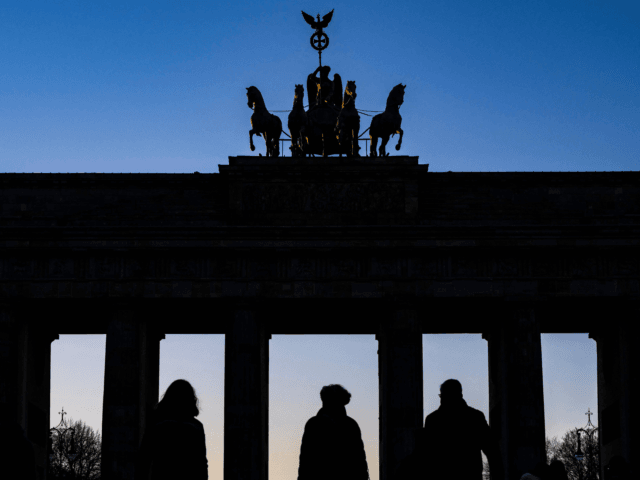Energy prices are set to soar across Europe and the UK again following Germany blocking the approval of Russia’s Nord Stream 2 pipeline amid the ongoing strife in Ukraine.
Europe’s natural gas price benchmark — which is determined by the price per unit of energy traded in the futures market in the Netherlands — saw a spike of 13 per cent on Tuesday. Even after coming down slightly on the day by the end of trading levelling out around 10 per cent higher, the market price is still 14 per cent higher than just five days ago.
Despite Russian gas only accounting for 3 per cent of Britain’s gas consumption, the UK, for its part, saw its own benchmark jump by 10 per cent on Tuesday, the i newspaper reported.
While the flow of gas has not changed from Russia into Europe as of yet, the futures traders were likely operating under the assumption that Russian leader Vladimir Putin would attempt to punish Europe after the decision by German Chancellor Olaf Scholz to prevent the controversial Nord Stream 2 pipeline from finding regulatory approval.
Playing into such concerns, former Russian President Dmitry Medvedev said in response to the pipeline cancellation on Tuesday: “Welcome to the brave new world where Europeans are very soon going to pay €2,000 for 1,000 cubic meters of natural gas!”
Currently, Germany receives around half of its natural gas from Russia. Chancellor Scholz has vowed to search for alternative sources of energy to become less reliant on Russia, yet, it remains to be seen if his coalition government — which is comprised partially of an alliance with the Green Party — will reverse the government’s decision to shut down its nuclear energy sector, or indeed lift the prohibition on fracking in Germany.
German Chancellor Sholz Blocks Approval for Russia’s Nord Stream 2 Pipeline over Putin’s Moves in Ukrainehttps://t.co/T8azzZThPQ
— Breitbart London (@BreitbartLondon) February 22, 2022
On Wednesday, Federal Minister of Economics Robert Habeck said that the government will look to at least temporarily suspend the Renewable Energy Act (EEG) surcharge tax on energy that is directed towards supposedly green energy sources such as wind and solar.
“We can hardly intervene in the world market price, for gas or oil. However, we will abolish the EEG surcharge,” the Green politician said.
Habeck went on to say that current stockpiles of gas in Germany will be able to sustain the country during the current crisis and said that ultimately Germany will be able to completely shift away from Russian gas.
Should Germany actually follow through and opt to buy liquified natural gas from the world market instead of directly from Russia, prices would likely rise dramatically around the globe, as demand rises on finite supply.
Germany ‘Dramatically Behind’ its Emissions Target After Abandoning ‘Dangerous’ Nuclear Energyhttps://t.co/9C9al17fGT
— Breitbart London (@BreitbartLondon) January 14, 2022
As has been the case with the UK, the dispute over Ukraine is likely to influence prices outside of Europe, such as in the United States of America as global demand jumps. Admitting to this reality, during a White House speech on Tuesday evening President Joe Biden said: “Defending freedom will have costs, for us as well, and here at home… We need to be honest about that.”
“I want to limit the pain the American people are feeling at the gas pump,” Biden continued.
Ukraine is one of many factors impacting fluctuations in gas prices — among them Coronavirus disruptions, strong demand in the east, rising demand in Europe as lockdowns end, and infrastructure and storage failures impacting reserve holdings.
Unlike Germany, Prime Minister Boris Johnson has so far refused to entertain tax cuts on energy, with estimates projecting that the average some 25 per cent of energy bills are directed towards green energy projects. The government has also refused to cut the Value Added Tax (VAT) on energy, despite Johnson previously arguing that such an idea would be a benefit of leaving the European Union.
A senior investment and markets analyst at British financial service firm Hargreaves Lansdown, Susannah Streeter told the Daily Mail: “Already oil and gas prices are marching upwards as Russia put boots on the ground in Eastern Ukraine, and as fears of an escalation of the situation mount, it’s led to expectations of even higher prices to come.”
She went on to warn that should a full-scale conflict break out, there could be further increases in food inflation as grain shipments from Ukraine, Russia, Romania, and Kazakhstan in the Black Sea could be disrupted.
“The extra pounds on bills are piling up for hard-hit families, with the increase in fuel, energy and grocery bills set to hit lower-income households harder as a higher proportion of their outgoings will be spent on travel costs. With budgets being squeezed further the likely knock-on effect will be a hit to consumer confidence after any lockdown savings are worn away.”
Build Back Better: From Boris Johnson to Greta and Extinction Rebellion, Britain’s Year of Climate Craziness https://t.co/L4Vn4BAqMi
— Breitbart London (@BreitbartLondon) December 31, 2021
Follow Kurt Zindulka on Twitter here @KurtZindulka

COMMENTS
Please let us know if you're having issues with commenting.